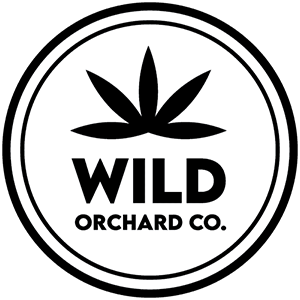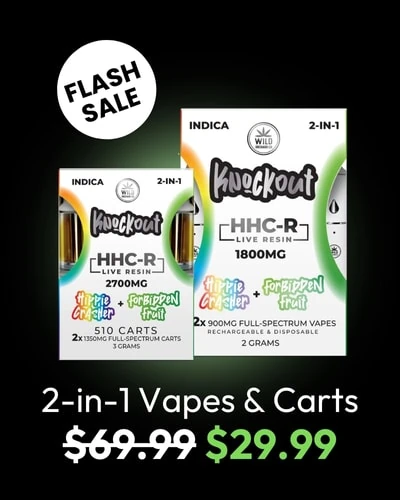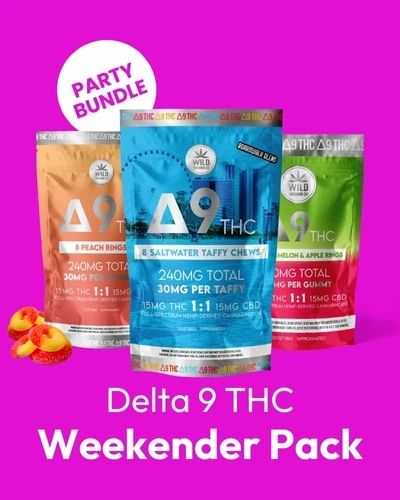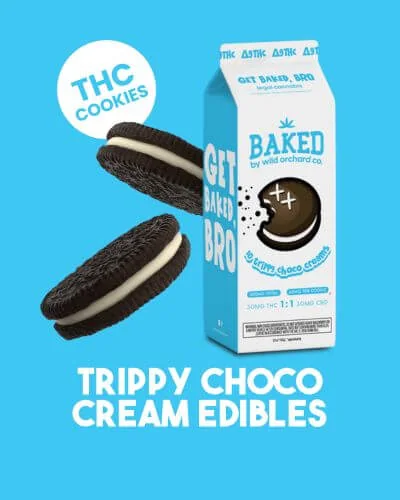THCA vs Delta 8: An Essential Guide to Cannabis Cannabinoids
Understanding the nuances between THCA vs. Delta 8 is crucial for anyone navigating the complex world of cannabis cannabinoids. Each of these compounds plays a unique role in the effects and benefits they offer, making them suited to different user preferences and needs.
- THCA: This is the non-psychoactive precursor found in raw cannabis plants, known for its potential anti-inflammatory and neuroprotective properties.
- Delta 8: Unlike THCA, Delta 8 is psychoactive but provides a smoother high compared to the more potent Delta 9 THC.
- User Experience: THCA is typically used for health benefits without intoxication, while Delta 8 is sought for its gentler psychoactive effects.
- Applications: THCA is often consumed in its raw form or as tinctures, while Delta 8 is popular in edibles and vape products.
- Legal Status: The legality of both cannabinoids can vary, so it’s important to check local laws.
As we delve deeper into the specifics of THCA versus Delta 8, it becomes clear that choosing the right cannabinoid depends on understanding their distinct characteristics. Whether you’re looking for therapeutic effects without a high or a milder alternative to more intense THC effects, knowing the key differences between THCA and Delta 8 will guide you to make informed decisions about their use. This guide aims to provide you with a clear and detailed comparison to enhance your understanding and help you navigate their uses effectively.

What is THCA?
THCA, or tetrahydrocannabinolic acid, is a non-psychoactive cannabinoid found primarily in fresh and live cannabis. Unlike THC, THCA does not produce a high until it undergoes decarboxylation, a process where it is exposed to heat which converts it into psychoactive THC. This cannabinoid is known for its potential therapeutic benefits, including anti-inflammatory and neuroprotective properties, making it a subject of interest for medical research.
What is Delta 8?
Delta 8 THC, a cannabinoid found in cannabis plants, is similar to Delta 9 THC, the most commonly known form of THC, but with a few key differences. It is psychoactive, though significantly milder than Delta 9. Users often report a clearer high with less anxiety and paranoia, which makes Delta 8 an appealing alternative for those who want the benefits of THC without its intense psychoactive effects. Delta 8 is also noted for its nausea-reducing and appetite-stimulating effects, adding to its value both recreationally and medicinally.

A Deep Dive into the Chemical Structures
Diving into the chemical structure of THCA and Delta 8 THC reveals why these compounds affect us differently. Both originate from the cannabis plant but their transformations and interactions within the body vary greatly due to their molecular makeup.
- THCA Structure: THCA contains an extra carboxyl group, which is non-psychoactive until decarboxylated.
- Delta 8 THC Structure: Delta 8 is similar to Delta 9 THC but has a double bond on the 8th carbon, reducing its psychoactivity.
- Psychoactive Properties: Removal of the carboxyl group from THCA through heat converts it to THC, which is psychoactive.
- Stability: Delta 8 THC is more stable than Delta 9, leading to a longer shelf life and a milder effect.
- Legality and Availability: Due to its stability, Delta 8 is often more available in markets where Delta 9 is restricted.
The chemical structures of THCA and Delta 8 play crucial roles in how they are used and experienced. THCA’s transformation into THC upon heating is essential for its psychoactive effects, making it popular for recreational use where legal. In contrast, Delta 8’s unique structure offers a less intense high, often preferred by those seeking milder effects or therapeutic benefits without overwhelming psychoactivity. Understanding these differences helps users make informed choices about their cannabis consumption based on their needs and legal restrictions.
From Plant to Product: Extracting and Producing THCA and Delta 8
The journey of THCA and Delta 8 from plant to product involves sophisticated extraction and production techniques. Each compound follows a distinct pathway that influences its final form and how it interacts with the body.
- Extraction of THCA: Cold methods typically extract THCA to prevent its conversion into THC.
- Production of Delta 8: Controlled conditions synthesize Delta 8 from CBD via chemical synthesis.
- Purity Control: Rigorous testing ensures the purity and potency of both compounds.
- End Products: Manufacturers often include THCA in tinctures and topicals, while Delta 8 frequently appears in edibles and vapes.
- Regulatory Compliance: Adhering to legal standards proves crucial for the sale and distribution of both compounds.
Once extracted, THCA and Delta 8 follow different routes in processing and formulation to become the products we use. THCA maintains its non-psychoactive properties until heat decarboxylates it, making it popular for medicinal use without the high. Meanwhile, Delta 8 provides a milder alternative to Delta 9 THC, offering users a less intense but still psychoactive effect. This makes it an attractive option for those who prefer a lighter experience or require less psychoactivity for therapeutic purposes. Understanding these processes allows consumers to make informed decisions about which cannabinoid might best meet their needs.

Effects and Benefits: How THCA and Delta 8 Impact Users
Exploring the distinctions and benefits of THCA versus Delta 8 helps us appreciate their unique roles in medicinal applications. Both cannabinoids, derived from the cannabis plant, offer varied therapeutic benefits that are valuable for different health conditions.
- THCA Benefits: Known for its anti-inflammatory, neuroprotective, and anti-nausea properties.
- Delta 8 Benefits: Appreciated for its ability to reduce anxiety, manage pain, and help with insomnia.
- Non-Psychoactive: THCA does not produce a high, making it ideal for patients needing symptom relief without the psychoactive effects.
- Milder Psychoactivity: Delta 8 offers a less intense high compared to Delta 9 THC, suitable for those who prefer a lighter touch.
- Legal Status: Both cannabinoids have varying legality, so checking local regulations is crucial.
Delta 8 and THCA cater to different user needs in the realm of medical cannabis. THCA is predominantly used for its potential to alleviate chronic symptoms without inducing a psychoactive state, making it a favorite among those who prefer treatment without disruption to their mental clarity. Conversely, Delta 8 provides a controlled psychoactive effect that can assist with emotional and physical ailments, presenting a valuable alternative for those seeking mild euphoria as part of their therapy. Understanding these nuances enables users to make more informed decisions about which cannabinoid to incorporate into their health regimen, depending on their specific condition and desired outcomes.
Practical Usage: Optimal Ways to Use THCA and Delta 8
Understanding how to effectively use THCA and Delta 8 can significantly enhance your experience with these cannabinoids. Each has distinct properties and uses, catering to different preferences and requirements.
- THCA Application: Ideal for consumption in its raw form in smoothies or salads to leverage its health benefits without psychoactive effects.
- Delta 8 Use: Best enjoyed in gummies or vapes for those seeking its milder psychoactive effects compared to traditional THC.
- Heating THCA: To unlock its psychoactive potential, THCA must be decarboxylated, typically by smoking or vaporizing.
- Dosage Guidance: Begin with lower doses of Delta 8 to assess individual response and adjust gradually.
- Storage Tips: Store both cannabinoids in cool, dark places to preserve their potency and quality.
Delta 8 and THCA serve different purposes based on their chemical makeup. For users seeking relief without the high, THCA in its raw form is a superb choice, offering significant therapeutic benefits. Meanwhile, Delta 8 is a go-to for those preferring a gentle psychoactive effect, making it a popular alternative for relaxation and mild euphoria. These cannabinoids, when used appropriately, provide flexibility in managing wellness and recreational activities, ensuring users can tailor their cannabis experience to their specific needs.

How to Use THCA and Delta 8: Tips for Consumers
To effectively utilize THCA and Delta 8, it’s essential to understand their best usage methods, tailored to their distinct properties. Each offers unique benefits depending on how they are used.
- Raw Consumption of THCA: Incorporate THCA into your diet without heating to maintain its non-psychoactive benefits.
- Vaporizing THCA: Heat THCA to activate THC for its psychoactive effects.
- Delta 8 Edibles: Consume Delta 8 in edibles form for a controlled and extended release of effects.
- Delta 8 Vaping: Use vapes for quick onset of Delta 8’s mild psychoactive effects.
- Dosing Tips: Start with small amounts, especially with Delta 8 edibles, to gauge your personal tolerance.
When considering THCA and Delta 8, it’s crucial to choose the method that aligns with your desired outcomes. THCA is ideal for those seeking therapeutic benefits without the high, often used in its raw form in foods like smoothies and salads. On the other hand, Delta 8 is favored for its milder high and is commonly found in edibles and vapes, providing a less intense experience compared to Delta 9 THC. Understanding these usage tips ensures you can maximize their potential effectively and safely, aligning with your wellness goals.


FAQs
What is THCA?
THCA, or tetrahydrocannabinolic acid, is a non-psychoactive cannabinoid found in fresh cannabis plants. It does not cause a high until it is converted into THC through heat.
What is Delta 8?
Delta 8 is a cannabinoid similar to THC but with less psychoactive potency. It is known for providing a clearer high with fewer anxiety effects compared to Delta 9 THC.
Which is stronger, THCA or Delta 8?
Delta 8 is psychoactive and provides a noticeable high, which makes it stronger in psychoactive effects compared to THCA, which does not cause a high in its natural state.
Is THCA more potent than Delta 9?
In terms of psychoactivity, THCA is less potent because it is non-psychoactive until converted to THC. Delta 9 THC is immediately psychoactive and more potent in causing a high.
Is Delta 8 legal everywhere?
No, the legality of Delta 8 varies by state. It is essential to check local laws to understand whether Delta 8 is legal in your area.
What are the main uses of Delta 8?
Delta 8 is commonly used for its mild psychoactive effects and is favored for managing anxiety, pain, and nausea without the intense high of Delta 9.

Comparative Analysis: THCA vs Delta 8 in Scientific Research
Scientific research into THCA and Delta 8 sheds light on their distinct properties and potential health benefits. These studies are crucial as they inform users and medical professionals about the effective uses and safety of these cannabinoids.
- Neuroprotective Properties: Research highlights THCA’s potential to protect brain cells from damage.
- Anti-inflammatory Effects: Both THCA and Delta 8 show significant anti-inflammatory responses in studies.
- Pain Relief: Delta 8 is particularly noted for its ability to alleviate chronic pain.
- Anxiety Reduction: Studies indicate Delta 8 helps reduce anxiety without the intense high of Delta 9 THC.
- Cancer Research: Early studies suggest THCA might inhibit the proliferation of cancer cells.
Further research into THCA and Delta 8 continues to uncover how these cannabinoids can be utilized therapeutically. While THCA offers significant potential without psychoactive effects, making it suitable for daytime use, Delta 8 provides a milder, manageable high that many find beneficial for treating ailments like pain and anxiety without the overwhelming effects associated with stronger THC forms. This ongoing research is vital for developing guidelines for their use in clinical settings, ensuring patients receive effective and safe treatment options.

Final Thoughts: Making the Best Choice Between THCA and Delta 8
Choosing between THCA and Delta 8 depends largely on your specific needs and the effects you’re seeking from cannabis use. Each compound offers unique benefits, making them suitable for different purposes.
- Psychoactivity: Opt for Delta 8 if you’re seeking mild psychoactive effects.
- Therapeutic Use: Choose THCA for anti-inflammatory and neuroprotective benefits without the high.
- Legality: Check local laws, as Delta 8 might not be legal in all areas, unlike THCA.
- Consumption Preferences: Consider edibles or vapes for Delta 8; use raw THCA in dietary intake.
- Personal Tolerance: Delta 8’s milder high might be more suitable for those sensitive to THC.
Making the final choice between THCA and Delta 8 should consider these points to align with your lifestyle and health objectives. THCA is excellent for those who want to avoid the psychoactive effects of cannabis while still reaping substantial health benefits. On the other hand, Delta 8 provides a less intense high compared to traditional THC, ideal for users looking for anxiety relief or a mild euphoric feeling. Understanding these distinctions will help you make an informed decision that best suits your needs, ensuring you derive the maximum benefit from your cannabinoid of choice.


 Flash Sale
Flash Sale  Party Bundle
Party Bundle  Back in Stock!
Back in Stock! 










